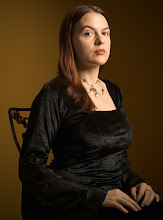I have this week off from work to spend time researching WOMEN WARRIORS for my project. One thing that I have discovered that really should not have surprised me is one of the reasons why and when women began to be dominated and left out of history. Here are some quotes from author David E. Jones' book Women Warriors: A History:
"The shift in the perception of women as legitimate sources of power in Europe in the fifteenth and sixteenth centuries bears comment. A key is found in the struggle between powerful male and female leaders of religious communities. The power that abbesses had accrued over time, based on their positions as managers and tax collectors over vast tracts of land and dozens of villages, had put them in a position to thwart male church leaders from priests to bishops to, in some cases, the pope."
Jones goes on to explain the powers of the women had been based on the ancient Christian ideas of religious organization, and the veneration of Mary. "Typically more noblewomen than noblemen were literate," which allowed for women like Abbess Audisia to appeal to the pope and win an excommunication case brought against her by a bishop.
"The official unraveling of the abbess's powers can be found in the Council of Trent....the call for the reformation of religious orders and the empowering of bishops as representatives of the pope, thus rendering them superior to women...."
So, yes, thanks to the Holy Catholic Church, we have one of the reasons why power was taken away from women. I knew I disliked Sunday School for some reason....
This is, by no means, the only reason women are more difficult to find and trace in history. I just got uppity about it and wanted to write something. Maybe a Warrior Nun will make it into my project....!
Here are more religious examples (for warfare) I found on a Wiki of Women in Medieval Warfare:
590 AD: The Christian Synod of Druim Ceat issues a decree that English women can no longer go into battle alongside men.
697: Roman Catholic priests forbid Irish women and children from being present on contested battlefields.
Some other reasons most likely include the fact that much history was kept orally, and that over time names and deeds have been lost, not only of women but men. I think that this would hold especially true in cultures that have disappeared, or that had no written language. But I am not a cultural anthropologist....
Women Warriors: A History by David E. Jones, 1997, Brassey's Washington & London, pp. 155-156
Thursday, February 28, 2008
Subscribe to:
Post Comments (Atom)


No comments:
Post a Comment